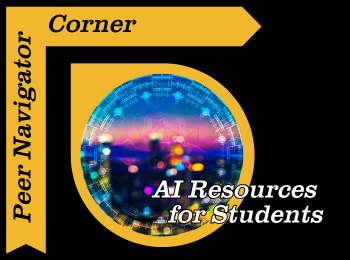Written by: Josiah Abbott
Unless you have been living under a rock, you’re aware of the rapid advancements being made in the AI industry. With the broad usability of AI, there are many resources available to students as we strive for academic excellence at Mizzou. A variety of tools, suggestions on prompting, and details on ethical considerations can be found through the Libraries’ AI guide, but I’ve highlighted a few below.
The resources I am covering in this article are beneficial for efficiency when studying, note-taking, or looking for information. I want to add a warning to not use AI for graded assignments unless a professor has explicitly given permission. If you are unclear on whether AI is prohibited or not, first check the syllabus. Professors are supposed to include guidelines on AI usage in it, but if this is not the case, you can also email them. Because of concerns with academic integrity regarding AI, do not use it if it could put your education at risk.
To begin, I’m sure many of you have seen or even gotten a text from Roary, Mizzou’s AI helpbot. Roary is primarily intended to be used when searching for a process, location, or department to contact. For example, if you need a recommendation on where to study, Roary will give you a list of locations. If you need contact information for the financial aid office, Roary will reply with it almost immediately. Beyond that, Roary can’t do much more. I wouldn’t ask coursework questions as the AI was not trained on that. However, when you have questions regarding life at Mizzou, instead of clicking around the website for 5 minutes, just ask Roary.
Another helpful tool is Notion AI, a note-taking and scheduling tool one of my fellow peer navigators found. What is so unique about Notion AI is that it can search through all input information (notes, schedule, etc.) and answer questions based on that information. Say you remember talking about feudalism in class but are struggling to remember which of your notes it was in. Just ask Notion AI, and it will give you the correct section and title of what you need. Even better than that, instead of rereading the notes, you could just ask the AI to summarize the topics for a quick refresher. Integrating Notion AI isn’t difficult either. It allows you to sync your Google calendar to quickly load in all of your schedule, as well as upload your notes from a variety of formats, including directly from Google Docs.
If you are looking for help starting a research project, Consensus is a useful option that utilizes the Semantic Scholar database of open access research. A powerful research tool, Consensus allows you to enter a question and will search for and pull 20 relevant papers. After pulling the articles, it gives a brief outline of arguments on both sides of the question with a conclusion to sum it up. For each source, it breaks down how many times it is cited, the type of study it is, and has preloaded citations. With a wide range of filters, you can also narrow down the articles it pulls. Even better, Consensus is constantly being updated with new tools, including a consensus meter that gives a breakdown of articles’ stances on the question. Overall, Consensus is my pick for an AI tool to use in order to jumpstart your research.
Finally, a recent breakthrough, DeepSeek AI, blew up the generative AI market recently (January, 2025). It is an open-source AI competitor in a market dominated by closed-source tools. Combining its relatively cheap production costs and similar computing efficiency, it may be the best GenAI on the market. Currently it matches OpenAI’s ChatGPT Pro plan ($200 a month) for a whopping $0. However, this is not a tool I would recommend using straight from the source on their site or phone app. Created and marketed from a Chinese company, this tool comes with concerns about data harvesting and security flaws in the program. However, the open-source nature allows businesses to run it locally where they can tweak parameters for better responses and implement security for individual iterations. Although not a tool an average person should use, I would encourage you to keep an eye on news surrounding it.
